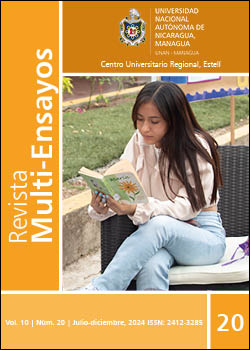Epistemological paradigms of research and the relationship with the generation and adoption of agricultural technologies
DOI:
https://doi.org/10.5377/multiensayos.v10i20.18680Keywords:
Agricultural innovation, research approaches, rural development, appropriate technologiesAbstract
This argumentative essay deals with an analysis of the relationship between epistemological paradigms of research and the generation and adoption of agricultural technologies. A documentary review was carried out on the positivist, interpretative and socio-critical scientific paradigms, analyzing which are the most used in the development and adoption of technologies. The analysis of the approaches of each of the paradigms and the context of the generation and adoption of technologies in Nicaragua allowed the identification of the contributions of each paradigm to the success of research and generation of technologies. In this sense, the different tools of each paradigm can be used to identify problems in the agricultural sector and contribute to the generation of technologies that respond to emerging needs in the face of changing climate conditions. The positivist paradigm contributes many elements in the research for the generation of technologies, however, for the adoption of these, it is necessary to take into account elements of the other paradigms for their complementation.
Downloads
References
Alvarado , L., & García , M. (2008). Características más relevantes del paradigma sociocrítico. Revista universitaria de Investigación, 187-202. Obtenido de https://www.redalyc.org/articulo.oa?id=41011837011
Flores , M. (2004). Implicaciones de los paradigmas de investigación en la práctica educativa. Revista digital universitaria, 5(1). Obtenido de https://biblat.unam.mx/es/revista/revista-digital-universitaria/articulo/implicaciones-de-los-paradigmas-de-investigacion-en-la-practica-educativa
Hernández Sampieri, R., Fernández Collado, C., & Baptista Lucio, M. (2014). Metodología de la Investigación . Ciudad de México : Mc Graw Hill.
Jiménez , E. (2018). Pensamiento filosófico de Karl Popper. El falsacionismo. Boletín Científico Con - Ciencia. Obtenido de https://www.uaeh.edu.mx/scige/boletin/prepa3/n9/r1.html
Kuhn, T. (1962). La estructura de las revoluciones científicas . Ciudad de México: Fondo de Cultura Económica .
Loza, R., Mamani, J. L., Mariaca , J., & Yanqui, F. (2020). Paradigma sociocrítico en investigación. PsiqueMag: Revista Científica Digital de Psicología, 30 - 39. Obtenido de https://revistas.ucv.edu.pe/index.php/psiquemag/article/view/216
Martínez Marín , A., & Ríos Rosas, F. (2006). Los conceptos de Conocimiento, Epistemología y Paradigma, como Base Diferencial en la Orientación Metodológica del Trabajo de Grado. Cinta de Moebio, 111 - 121. Obtenido de https://www.redalyc.org/articulo.oa?id=10102508
Ramos, C. (2015). Los paradigmas de la investigación. Avances En Psicología, 23(1), 9–17. Obtenido de https://revistas.unife.edu.pe/index.php/avancesenpsicologia/article/view/167
Ricoy , C. (2006). Contribución sobre los paradigmas de investigación. Revista do Centro de Educação, 31(1), 11 - 22. Obtenido de https://www.researchgate.net/publication/279666576_Contribucion_sobre_los_paradigmas_de_investigacion
Santos , Y. (2010). ¿Cómo se pueden aplicar los distintos paradigmas de la investigación científica a la cultura física y el deporte? Podium, 5(1), 1-10. Obtenido de https://podium.upr.edu.cu/index.php/podium/article/view/201

